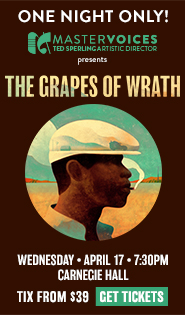Mirror Visions Ensemble mines a rich vein of “beastly” rarities

Mirror Visions Ensemble (Vira Slywotzky, Mischa Bouvier and Scott Murphree) performed Monday night at the Sheen Center. Photo: Jennifer Taylor
Art song is among the most well-populated genres in the musical literature, but the scope of what we actually hear of it is somewhat narrow. Schubert, Schumann, and Strauss make up the lion’s share, helped along by healthy doses of Tchaikovsky, Wolf, and Poulenc, with occasional doses of Britten, Duparc, and Hahn for extra flavor.
In that regard, the Monday night presentation of the Mirror Visions Ensemble at the Sheen Center downtown was a gift: their 90-minute program felt like a tour of art song’s lesser known curiosities, the gems that lie hidden off the back roads. The selections on Monday’s program spanned Spanish renaissance, contemporary composition, and seemingly everything in between.
The voices heard at Monday’s concert were not especially remarkable on their own terms. Vira Slywotzky’s broad, breathy soprano lacked focus, and tenor Scott Murphree often sounded pinched. Baritone Mischa Bouvier was the most solid of the three, showing a fine cedar tone, but even he was overmatched at his top.
Yet all three proved to be superior interpreters, showing deep engagement with the works and singing with both humor and emotion. Oriented around the theme “Of Beasts and Brutes,” Monday’s program no doubt had a lofty statement in mind, juxtaposing charming songs about animals with songs written either about or during the tenures of brutish tyrants; in the end, though, it was just a fine selection of contrasting material, alternately light and devastating.
The “Older Beasts” section reached back as far as Josquin des Prez’s “El grillo” (“the cricket”), a light-hearted quasi-chorale for three voices, bright and cheeky, reveling in its freedom from all cares. Two settings of Jean de La Fontaine’s classic poem “La cigale et la fourmi” (“The grasshopper and the ant”) contrasted brilliantly: first came Saint-Saëns’ coy, charming number, pecking at the listener with short, jumpy phrases; Murphree gave the song a lively performance, turning the text into a delightful vignette. Following was André Caplet’s take, more melancholy, if comically so—Bouvier sang it with delicious self-pity.
Pianist Margaret Kampmeier did fine work all night, most especially in material from around the beginning of the twentieth century. She accompanied “Le martin-pêcheur” (“The kingfisher”) in perfect Ravelian style, capturing a zen-like calm that bordered on languor. In Kodály’s “Youth is like a falcon,” she offered a gorgeous, glistening touch in support of Slywotzky, who beautifully captured the yearning spirit of the song.
“Older Brutes” featured some of the stranger but more entertaining offerings of the evening, including what were essentially two declamations with piano accompaniment: Arnold Schoenberg’s treatment of Byron’s “Ode to Napoleon Buonaparte” and William Walton’s setting of Edith Sitwell’s “Said King Pompey,” both given deliciously hammy performances by Bouvier and Slywotzky. In its world premiere, Scott Wheeler’s “Et tu Brute Fanfare” proved a curious rumination for three voices on Caesar’s reported last words, sometimes plaintive, sometimes accusing.
“Newer Beasts” was made up entirely of Mirror Visions commissions, starting with three irresistibly funny animal portraits: “The Duck” (“Behold the duck!” it begins, with hilarious gusto), the mock plainchant of “The Pigeon,” and the jig-like “The Rooster,” all settings by Richard Pearson Thomas of Ogden Nash’s light verse. Three premieres by Francine Trester proved more haunting, especially the last, “Wolf Head (Elegy for Echo),” showing imaginative musical writing and a keening melody laden with emotion.
“Newer Brutes” offered selections connected to familiar dictators of the twentieth century: Stalin was represented by the energetic, dance-like folk energy of Shostakovich’s “Fussy Mummy and Auntie,” from Jewish Folk Poetry. The two nods to Francisco Franco, Christopher Berg’s setting of García Lorca’s “Casida de las palomas oscuras” (“Song of the Dark Doves,” another premiere) and García Lorca’s own “Las morillas de Jaén, struck a note of quiet regret. Two songs from the Hollywooder Liederbuch of Hanns Eisler, a Jewish refugee of Nazi Germany, seemed burdened with memory, almost in Schubertian fashion: melodic lines rich with grief over a simple but vivid accompaniment.
The final set, “Birds in Ukraine,” classic Russian melancholy from Tchaikovsky and Glinka, was not the best fit for these three singers, relying more on lyrical ability, but that hardly detracted from what was on the whole an entertaining and imaginative evening of song.


